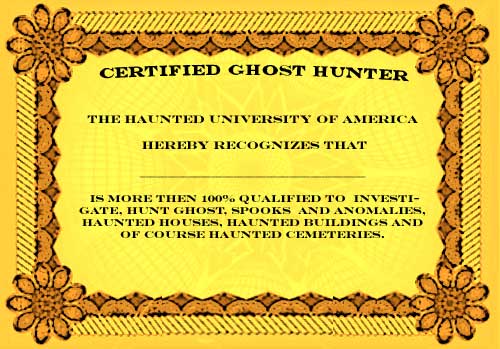This question recently popped up on a friend’s Facebook, so I’m going to add my 2 cents. First of all, this is a sore issue in itself with many people simply because of bogus paranormal certifications that are already out there and how those certifications have been used (monetary gain, One-upmanship, etc.). I believe that there are three general problems that have to be dealt with before this is even remotely possible.
1.)Generalization
In my opinion, the term “paranormal investigator” is too generalized to be certified in any way. There are too many disciplines involved to fully certify someone in such a broad category. Let’s look at Law Enforcement (for example). If I was to certify someone in Law Enforcement, exactly what would I be certifying? A police officer? Forensic scientist? A Game Warden? A Detective? A Parole Officer? A Secretary? You won’t find anyone in that career field that has the required training and can do all of those jobs. Each has distinctive training requirements and duties. On top of that you will also discover varying degrees on expertise in each.
Now try to look at Paranormal Investigation in the same manner. If you really think about it, there are allot of different jobs that would require varying degrees of expertise in the fields of psychology, physics, computing science, neurology, and the list goes on and on.
I think the key is to break it down into more distinct specialties. By defining those specialties you will also be able to develop an appropriate training curriculum and create a standardized method of study. I’m not talking about “ghost hunting 101” classes. I’m talking about continuing education through an accredited college.
2.)Certifying Authority
This is only ONE acceptable certifying authority, an accredited college. This is important for several reasons. Most of the present ideology about paranormal activity is based on unproven hypotheses. Until something is proven scientifically and accepted, the only reliable way is to utilize an appropriate college degree as the basis of knowledge and training. If you’re “EVP Specialist” has a degree in audio engineering he would be more qualified to make a determination on an unusual audio clip than someone who learned about EVP recording by reading about it on the internet. Although he would not be an expert on EVP (as it still is an unproven phenomena), he is a knowledgeable person when it comes to sound recording an audio analysis.
The second reason this is so important is the scientific community itself. Your educational background is the basis of what qualifies you to do research (your knowledge base) and in itself is a requirement of the scientific method, especially when a research work is going into its peer review.
3.)Curriculum
There is allot to debate here on what would be the most useful. I have a few of the ideas I have below.
EVP: (Sound Recording Technology, Audio Engineering)
Photo/video (evidence review): (Physics/Optics or Geospatial Intelligence/Imagery analyst)
Anyway..you get the point. With an accredited college, no one can question the certifying authority or the critera of the training involved.
